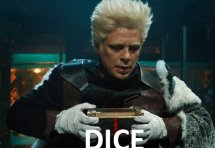GMMichael
Guide of Modos
In the majority of RPGs that I've seen, the Game Master narrates what happens in the world, and what happens when PCs take actions. Sometimes, the GM doesn't know what happens, so the GM asks for a roll, or makes his own roll (unless, you know, Numenera, in which the GM doesn't roll).
When it comes to a simple does-this-happen-or-not, the GM either knows or isn't sure. If the GM isn't sure, it's probably because the odds of one result or the other are very close to 50%. Why not just flip a coin to resolve it? Is more precision really necessary?
If one result has 75% odds of happening, I think most GMs can say, "this is easily more likely than not, so yes, it happens." Suppose those odds drop to 70%. Does the GM really need to roll a d20, or can she say that it's close enough to 50/50, and just flip a coin?
My next question stems from combat, when the GM is supposed to do a more significant amount of dice rolling. Is there an important difference between the BBEG hitting* PC1 at a 30% rate, PC2 at a 55% rate, and PC3 at an 80% rate, or (almost) never hitting PC1, flipping a coin for PC2, and always hitting PC3?
*Take this part with a grain of salt - I'm not a big fan of the hit/miss dichotomy.
When it comes to a simple does-this-happen-or-not, the GM either knows or isn't sure. If the GM isn't sure, it's probably because the odds of one result or the other are very close to 50%. Why not just flip a coin to resolve it? Is more precision really necessary?
If one result has 75% odds of happening, I think most GMs can say, "this is easily more likely than not, so yes, it happens." Suppose those odds drop to 70%. Does the GM really need to roll a d20, or can she say that it's close enough to 50/50, and just flip a coin?
My next question stems from combat, when the GM is supposed to do a more significant amount of dice rolling. Is there an important difference between the BBEG hitting* PC1 at a 30% rate, PC2 at a 55% rate, and PC3 at an 80% rate, or (almost) never hitting PC1, flipping a coin for PC2, and always hitting PC3?
*Take this part with a grain of salt - I'm not a big fan of the hit/miss dichotomy.

